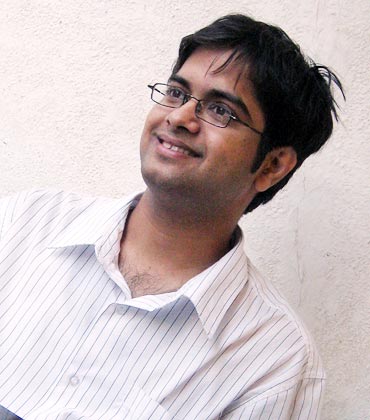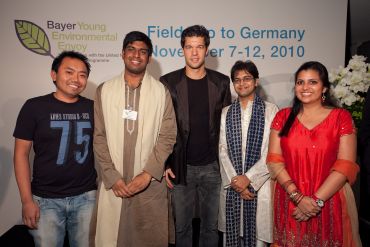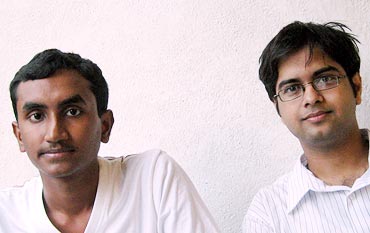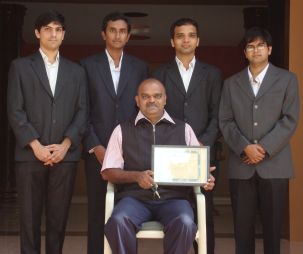 | « Back to article | Print this article |
Young dreams: Bringing technology to the masses
Vaibhav Tidke, a young entrepreneur fresh out of college, talks about how it's high time the government should tap into research, provide entrepreneurial opportunities, and support the pure sciences.
At a time when the fear of being stranded without a job is a major concern to undergraduates and postgraduates, here's someone who has chalked out his own path, and is already following his dream.
Vaibhav Tidke, who won the Bayer Young Environmental Leader's Award at the recent international event held in Germany recently, was already running an enterprise even as he was pursuing his studies at the Institute of Chemical Technology (ICT) in Mumbai.
The NGO, Science For Society, tries to make science useful to the masses and attempts to improve the provision of basic food and health services across the country.
24-year-old Tidke, who is currently a final year student of the Master's programme in Chemical Engineering at ICT says, "I'm concerned with working on the most basic needs like shelter and food, good technology and research. The two things that our education system is not paying attention to are research and entrepreneurship. There's just too much undue emphasis on campus placements," he says.
Click NEXT to read on...
'Pure sciences can lead to creation and innovation'
It was with this in mind -- and inspiration from his teacher, Professor Bhaskar Thorat, and peers -- that Science For Society was started -- to create research-based technological products, market them and work on several environmental and medical issues that the country needs to urgently address.
Water disinfection and purification, the processing of dental X-ray machines in order to improve the quality of X-ray diagnoses, solar drying and solar processing of vegetables to increase the shelf life of food -- these are some of the things that the NGO has kick-started.
Tidke feels that services such as these are important because they are not available in India -- and the reason why quality suffers. Machinery like the X-ray processing technology, he says needs to be imported from abroad and that often costs doctors and scientists heavily.
"It's high time we realised the importance of tapping undergraduate research simply because doing so can be very beneficial to the government," he adds.
Tidke says that he was naturally drawn to chemical engineering because chemistry, unlike many other fields, deals with pure science.
"Chemical engineering deals with basic science. And basic sciences can lead to actual creation and innovation -- whereas applied sciences do not help you to do that," he says.
Tidke admits that his foremost passions have always been technology and machines and that he was always more inclined towards mechanical and pure sciences right from the time he was in school -- he enjoyed physics and chemistry the most.
Tidke feels that the government needs to support research and make it viable. "Students have financial pressures; they need to support their families, and it's not their fault if they are drawn toward courses that claim to provide placements. But it's the government's responsibility to make sure that it offers funds for pure research, so we have more people engaging in it. The government and other agencies can benefit tremendously from good academic research," he adds, pointing out that universities in other countries are all ranked according to their research quality, and not according to the jobs or placements that they offer.
Click NEXT to read on...
'The government must encourage entrepreneurship'
The other thing that concerns Tidke is entrepreneurship. Though entrepreneurship cells have been initiated in institutions like the IITs, he feels more encouragement is needed.
"There are very few people who complete their education and then start up their own businesses," he says. "Research and entrepreneurship are key to development." Tidke's greatest inspiration has been his professor, Bhaskar Thorat, who teaches him chemical engineering at college where he is finishing his master's -- and who he would call his mentor.
"It was through my discussions and chats with him that I gained the guidance to start up Science For Society. We still have a long way to go with it," he says. Today, though Science For Society has just about 16 members, Tidke says it is growing.
Once he is done with his studies, Tidke plans to focus on the organisation rather than taking up a job offer.
"Next, we plan to set up a sister company, which will take care of the intellectual property rights and other legal aspects concerned with Science For Society," he says.
Tidke says his parents have always supported him in his endeavours though his mother initially hoped that he'd be a doctor. "But chemical engineering was always my first love and I convinced her I wanted to go for that," he says.
Click NEXT to read on...
'India is being noticed abroad'
Vaibhav Tidke says that he enjoyed the international event that was held in Germany in December 2010 mostly because it was heart warming to know that there was so much international awareness and interest about India. "Films making controversial statements on the education and medical system, like 3 Idiots and Munnabhai MBBS, have been noticed, which is a great thing," he says.
Tidke hopes to encourage more students to consider sustainable engineering as a career option, at a time when the earth and environment is in a dire need of it. "We have a responsibility to deliver to the earth and environmental heritage for the benefit of coming generations," he says. "Exams," he adds, "are something that one will always have to face in academics and one must do so positively and with a smile."
You can write to Vaibhav Tidke here: science4society@gmail.com



